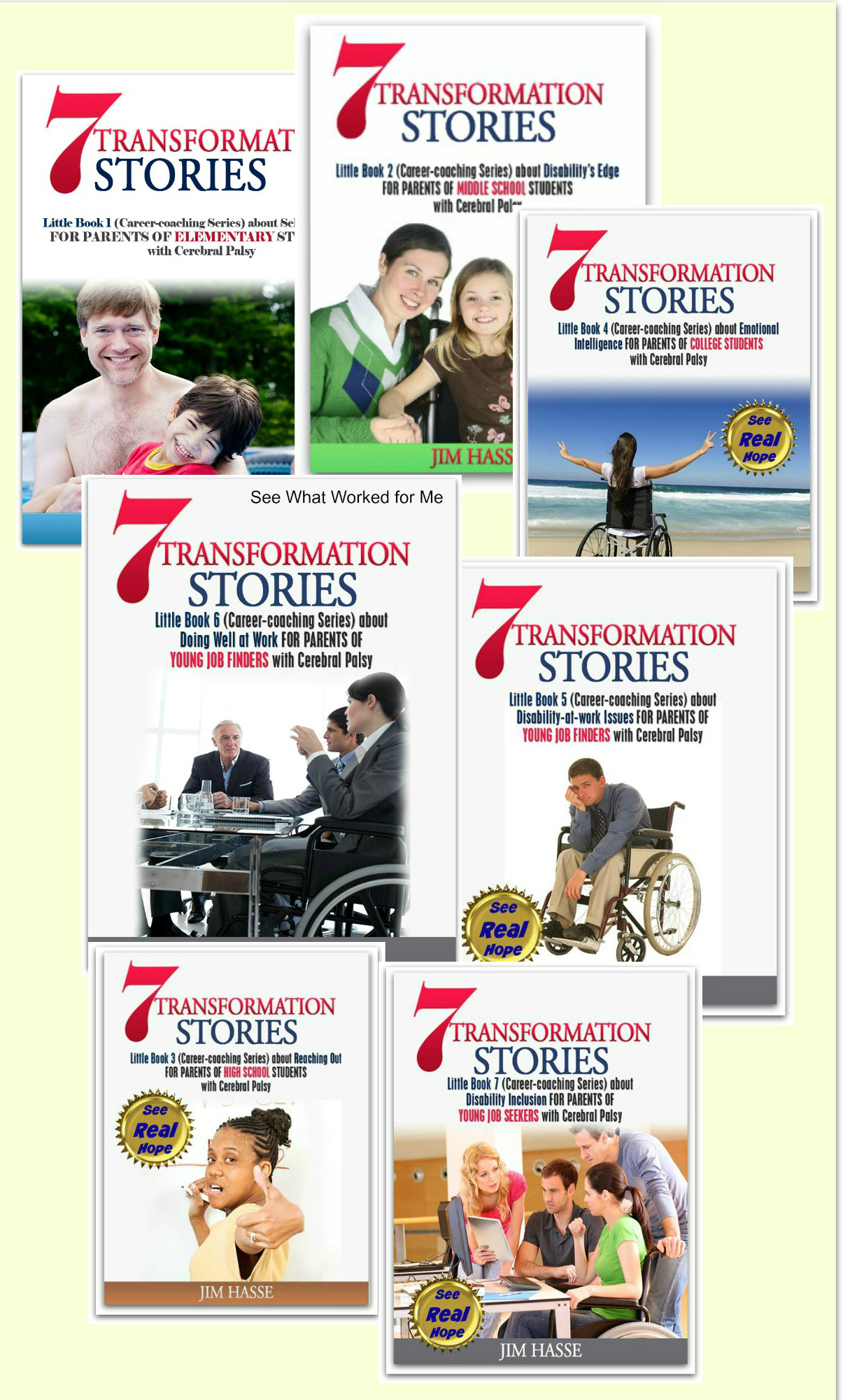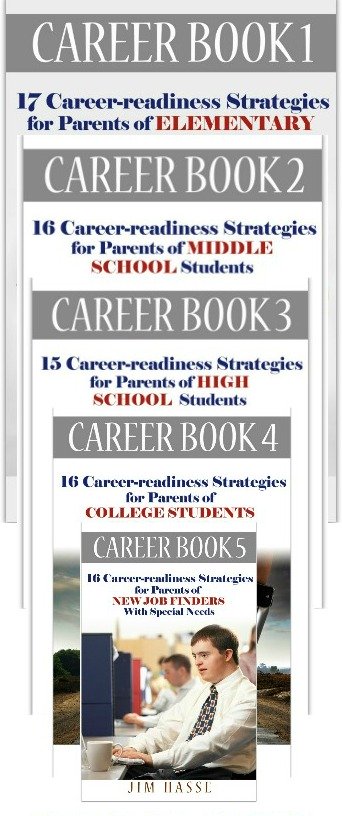College Courses: Cerebral Palsy
Career Builder for
College Students
By Jim Hasse, ABC, GCDF, Disability Employment Expert
_________________________________________________________
Before your college student gets deep into college courses,
I'd recommend checking the job
prospects for the field of study he or she plans to pursue
Your youngster with cerebral palsy (CP) may have an interest
in American literature, religious studies or art
history, but I doubt, as fields of study, they’ll offer a bright future in
terms of a job market, unless one plans to become of a part of academia.
I recognize that there are individuals who consider
their college years as a time for expanding their horizons, learning how to
learn and “finding themselves.” Yes, those activities are essential. And, taking those Liberal Arts college courses are helpful in gaining a well-rounded education.
Yet, as a person living with CP, I’ve always wanted
to know about the end game. When I was in college, I wanted to make sure I was
doing everything I could (such as taking job-focused college courses) to prepare for the real world of work.
Maybe I was too
competitive and too focused and passed up on soaking in some of the ambiance of
college life. But, I knew it would be tough for me to get a job due to my
CP, and I worked diligently to prepare myself for employment -- taking what I thought were the "right" college course at the time and gaining a high grade point average.
I liked to write. So I chose journalism and
advertising as a major and minor. I now see I was unknowingly preparing myself
for business journalism, even though that field had not yet appeared in any
labor department’s list of occupations.
And, I had no idea, in 1965, that someday I would be
a blogger. I believe it’s difficult to predict what the “hot jobs” will be five
years from now. If I were in college today, I’d be more open to “happenstance,”
the admission that even the most carefully crafted career plan can (and will)
take strange and wonderful twists and turns.
How is your college
student with a disability
preparing for unexpected turns
in future work opportunities?
Join PACER’s Facebook discussion.
Now that I’ve admitted my personal peculiarities when
it comes to choosing a career and selecting college courses, I feel I can more
freely recommend the following “job outlook” resources for your CP college
student.
 College courses are a path to the future.
College courses are a path to the future.What is hot right now
Let us start from the perspective of college degrees. From that vantage point, one can then always look at individual college courses.
"As is typically the case, business and engineering majors, plus those earning degrees in technical fields, including computer science, are most in demand at the bachelor's degree level," writes the National Association of Colleges and Employers (NACE) in its "2016 Job Outlook."
While some studies break down which degrees are most popular nationwide, NACE's study is unique in that it polls employers and asks them to forecast their hiring intentions.
In 2016, NACE says, the five most in-demand
bachelor’s degrees, based on employer hiring intentions, were in accounting,
finance, engineering, computer science and business administration (in that
order).
For a larger perspective, check the occupations with
the largest expected job growth from 2010 to 2020. Note that jobs in health care show the largest increases.
Additional career information is also available at CareerOneStop Toolkit.
And note this:
"If you have a college-bound tech-inclined child, you could do worse
than steer them toward cognitive computing, machine learning, and other
AI-based disciplines. The number of jobs in that field is going to
explode." - Shel Holtz, Communication Strategist, 03-10-2017.
Top resources
Here are five other resources I find useful:
- A
list of the occupations projected to grow the fastest is available
at http://www.bls.gov/emp/ep_table_103.htm
- Occupations
with the largest projected growth are available at http://www.bls.gov/emp/ep_table_104.htm.
- A
list of industries with the fastest projected employment growth is
available at http://www.bls.gov/emp/ep_table_203.htm
- The
Office of Occupational Statistics and Employment Projections home page at http://www.bls.gov/emp/
offers projected employment by occupation and industry.
- The Occupational Employment Statistics (OES) program (http://www.bls.gov/oes/) shows employment and wage estimates for more than 700 occupations for the U.S. as a whole as well as by state and metropolitan area.
For more detail about 250
different types of jobs, I recommend The
Occupational Outlook Handbook. It’s a nationally
recognized source of career information, designed to provide you with valuable
assistance in making decisions about your future work life.
The Handbook is revised every two years, and,
for each job, it tells you:
- Training and education (the college courses) needed.
- Earnings.
- Expected
job prospects.
- What
workers do on the job.
- Working conditions.
In addition, the Handbook
gives you job search tips, links to information
about the job market in each state, and more. You can also view frequently asked questions about the Handbook.
For the Handbook, the Bureau of Labor
Statistics develops projections only for the U.S. as a whole. Almost all states
make projections for their states and some
local areas. In addition, current employment data by occupation for states and
areas are available from the Occupational Employment Statistics survey.
The 2015-16 Occupational
Outlook Handbook was released in late March 2015.
The Handbook site
contains virtually identical material to the print version. However, if you
want a hard copy of the Handbook, ordering information is available from
the Government
Printing Office (GPO).
Remember that many of the new jobs
on the horizon have not yet appeared in government publications. Instead of
using these resources to pinpoint a specific job your college student may want to target, consider
them as general guidebooks to the short-term future of work
Also, they show general trends in the current
job market.
At any rate, from a longer point
of view, having the right degree (based on current readings of the job
prospects in your youngster’s field) and understanding how that degree your
youngster is working toward can best be leveraged in the job market are important factors in employment. That can help him or her be more attractive and competitive in
the job market when the time comes to make the transition from school to work.
Taking the right college courses now is often the key to getting hired later on.
How is your college
student with a disability
preparing for unexpected turns
in future work opportunities?
Join PACER’s Facebook discussion.
Return from College Courses to
Interview Tips
Go to Cerebral Palsy Career Builders
This is Creative Commons content. You can freely and legally use, share and repurpose it for non-commercial purposes only, provided you attach this sentence and the following attribution to it (including the two links):
Originally written and illustrated by Jim Hasse, ABC, GCDF, owner of Hasse Communication Counseling, LLC, who, as a person with cerebral palsy, served for 10 years as a vice president in a Fortune 500 company during his 29-year career in corporate communication. He’s an Accredited Business Communicator, certified as a Global Career Development Facilitator and author of 14 Amazon books about disability awareness and disability employment issues.





